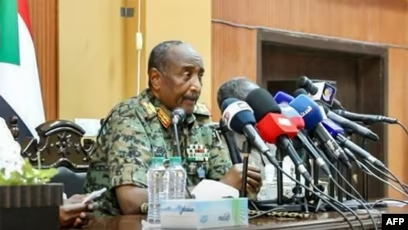PORT SUDAN, Sudan — Sudan’s de facto ruler and army chief, General Abdel Fattah al-Burhan, declared on Saturday that his government would not participate in peace talks scheduled in Switzerland, instead vowing to continue the conflict with rival paramilitaries indefinitely.
“We will not go to Geneva… we will fight for 100 years,” Burhan told reporters in Port Sudan, referring to ongoing peace initiatives aimed at resolving the 16-month-long conflict between the Sudanese Armed Forces (SAF) and the paramilitary Rapid Support Forces (RSF).

The United States initiated talks in Geneva on August 14, with the primary goals of alleviating human suffering and achieving a lasting ceasefire. While an RSF delegation attended the negotiations, the SAF abstained from physical participation, maintaining only telephone contact with mediators.
The talks, co-hosted by Saudi Arabia and Switzerland, included representatives from the African Union, Egypt, the United Arab Emirates, and the United Nations, collectively known as the Aligned for Advancing Lifesaving and Peace in Sudan Group (ALPS). The negotiations concluded on Friday without securing a ceasefire agreement but made progress on establishing aid access routes into Sudan.
Burhan’s refusal to engage in peace talks comes amid a worsening humanitarian crisis in Sudan. The United Nations reports that the conflict has forced approximately 20% of Sudan’s population to flee their homes, with tens of thousands of fatalities. Over 25 million people across the country—more than half its population—now face acute hunger.
The ongoing civil conflict began in April 2023 when tensions between Burhan and RSF leader Mohamed Hamdan Dagalo, also known as Hemedti, erupted into open warfare. The power struggle has devastated Sudan’s infrastructure, healthcare system, and economy.
International organizations have repeatedly called for an end to hostilities, warning of the conflict’s catastrophic impact on civilians. The UN Office for the Coordination of Humanitarian Affairs (OCHA) recently stated that the situation in Sudan represents one of the world’s worst humanitarian crises.

Despite Burhan’s hardline stance, some diplomatic efforts continue. A senior U.S. State Department official, speaking on condition of anonymity, expressed disappointment at the SAF’s refusal to participate in the Geneva talks but emphasized that diplomatic channels remain open.
“We continue to engage with all parties to find a peaceful resolution to this conflict,” the official stated. “The humanitarian situation demands urgent action, and we call on all sides to prioritize the needs of the Sudanese people.”
Regional experts warn that Burhan’s rhetoric could further escalate the conflict and complicate international efforts to broker peace. Dr. Amani El Taweel, a Sudan specialist at the Al-Ahram Center for Political and Strategic Studies in Cairo, told the Associated Press, “This statement reflects the military’s belief that a decisive victory is still possible, despite the enormous human cost.”
As the conflict persists, neighboring countries grapple with a growing refugee crisis. The UN Refugee Agency (UNHCR) reports that over 1.3 million people have fled to surrounding nations, primarily Egypt, Chad, and South Sudan, straining already limited resources in these countries.
The international community now faces the challenge of addressing the immediate humanitarian needs in Sudan while continuing to pursue diplomatic solutions, despite the apparent intransigence of key parties to the conflict.



